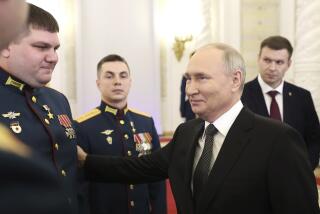For Russia, a Crucial Election : Yeltsin has obligation to ensure fairness of Dec. 12 vote for Parliament
- Share via
Boris N. Yeltsin says he has changed his mind about holding early presidential elections in Russia next June. Instead, he told leaders of his country’s mass media in a closed-door meeting, he plans to finish out his five-year term in 1996 and then, after finding a “good candidate” to succeed him, he will retire.
Skeptics--and there are many when it comes to assessing Yeltsin’s fidelity to democratic principles--saw in the first part of this announcement fresh evidence that the president is a man whose word is not to be trusted, and in the second part a sly condition that would allow him at a later date to say he had changed his mind about quitting after a single term. The skeptics could be right. But in this case, give Yeltsin the benefit of the doubt.
His proposal to advance the presidential election was made in mid-September in an effort to get a Parliament that was largely hostile to his reform program to agree to hold earlier legislative elections. When Parliament rejected this deal, his offer became void--or certainly Yeltsin could contend.
The important thing from here on is what happens in the elections for a new Parliament that are scheduled for Dec. 12--not simply how those elections come out but, no less significant for the future of democracy in Russia, how they are conducted.
Dozens of parties could qualify for the ballot. Some of the least attractive among them--communists on the left, ultranationalists on the right--complain the government is doing all it can to undermine their campaigns by interfering with their organizing activities and denying them press coverage. No one is likely to confuse these extremist parties with movements for democratic reform. But to stack the deck against them suggests an ominous reversion to the tactics that have held back political progress in Russia for centuries.
The United States and other democracies have an enormous stake in the success of Russian reforms. The Dec. 12 legislative elections could be the most crucial test yet of whether freely chosen political change is possible. Unless the process is fair, stability in Russia isn’t possible. And an unstable Russia is inevitably bad news for the world.
More to Read
Sign up for Essential California
The most important California stories and recommendations in your inbox every morning.
You may occasionally receive promotional content from the Los Angeles Times.












